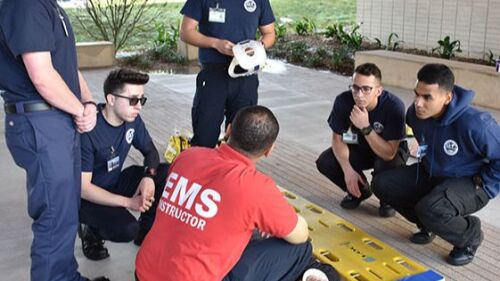Within fire-based EMS systems everywhere, the numbers of firefighter-paramedics are dwindling. Fire departments are scrambling to fill their immediate vacancies by drawing in new paramedics. Recruitment campaigns promising great benefits, sign-on bonuses and guaranteed shifts away from the ambulance are filling up social media feeds.
Ten years ago, when fire department jobs were scarce, campaigns like these would have brought in a flood of qualified candidates. Not so in today’s world. Everyone is hiring. And many agencies that used to require a paramedic license to even be considered have lowered the required qualifications just so they can fill all the empty seats on their fire engines. Even those vacancies have become a struggle to fill.
It’s time for fire-based EMS to realize that there simply aren’t enough paramedics out there to fix our problem. The answer lies within — encouraging our existing firefighters and firefighter-EMTs to become paramedics. But to do that we must first be honest and talk about the reasons they don’t become paramedics.
| Start your firefighter career search at FireRescue1 jobs
Are all firefighters paramedics?
No. Not all firefighters become a firefighter paramedic. Here is a countdown of the top five reasons firefighters don’t become paramedics.
5. The National Registry exam
Firefighters and written tests go together like oil and water. We like to get our hands dirty and prove ourselves through action. The thought of going toe-to-toe with the National Registry is enough to make any firefighter walk away, especially those who struggled through it to become an EMT.
4. Time is money
I’ve heard people say, “going to paramedic school would be a pay cut.” And they aren’t lying.
Firefighter salaries, especially those just starting out, are low. At the beginning of my career as a full-time firefighter-paramedic, I qualified to receive government assistance for free milk, baby formula and peanut butter. I remember losing my temper at a grocery store cashier for trying to shame my wife when she pulled out the big paper tickets that covered the cost of those essential items. I had just come home from a 24-hour shift. I hadn’t slept. It wasn’t pretty.
Eventually, like every firefighter I know, I took on a second job. A necessity that many of us depend on just to keep our families afloat. I was lucky enough to have gone to paramedic school before I had kids. Had I waited, I might never have.
3. Limited online paramedic class options
Online learning is not the future of education, it’s the right now. Associate degrees, bachelor’s degrees and even master’s degrees are being earned at fire station kitchen tables everywhere. And though paramedic programs are adapting to accommodate the modern-day learner, the amount of content, clinicals and rapid-fire pace have held them back from breaking with the classroom.
Even though paramedic programs are shorter and typically less expensive, the ease with which other college degrees can be earned online is drawing firefighters looking to advance their careers away from earning their gold patch.
2. Getting stuck on the ambulance
When compared to a suppression apparatus, being assigned to an ambulance means longer hours away from the station and more territory to cover. It brings paperwork, liability and the constant battle to remain professional in the face of disgruntled nurses at overcrowded hospitals. And because firefighter-paramedic numbers are so limited, many are being forced to spend the majority of their careers on ambulances. Due to department necessity, they’re stuck.
Firefighters and firefighter-EMTs see what is happening. And many are choosing to ride backward on a fire apparatus rather than risk being assigned to an ambulance for the next 20 years.
1. Organizational culture
“I’m not going to medic school because I want to be a firefighter.”
To the outside world, we’re all firefighters. But for those working within fire-based EMS, we are either firefighters or paramedics. The divide is real. So when firefighters and firefighter-EMTs talk about going to paramedic school, they’re treated as if they are changing teams. They’re shamed, ridiculed and reminded of all the hardship they will be bringing upon themselves.
Unfortunately, some are even coached by senior leadership to avoid becoming paramedics so as not to stagnate their careers by being stuck in an ambulance. Of all the reasons firefighters are choosing not to become paramedics, this is the most toxic. Placing individual ambitions above the needs of our respective communities will certainly lead to the failure of our mission.
What do we do now?
For all the problems I listed above, there are solutions – some less complicated than others, but none can happen overnight. It starts at the top with those responsible for cultivating a culture of success. Fire chiefs, if you’re wondering why your fire department isn’t growing its own paramedics, the problem isn’t with the seeds; it’s in the soil.
Go to your city councils, your fire boards, your citizens. Help them understand what firefighter-paramedics do and what it will mean if we run out. Garner their support to create an environment where firefighters who are willing to go through the struggle of achieving the gold standard of prehospital care are valued. Fight for your firefighter-paramedics as hard as you fight for that new fire engine. Show them you care. Because if you don’t, why should anyone else?
Deputy Chief Billy Goldfeder breaks down this issue in this What’s YOUR Problem? video:















